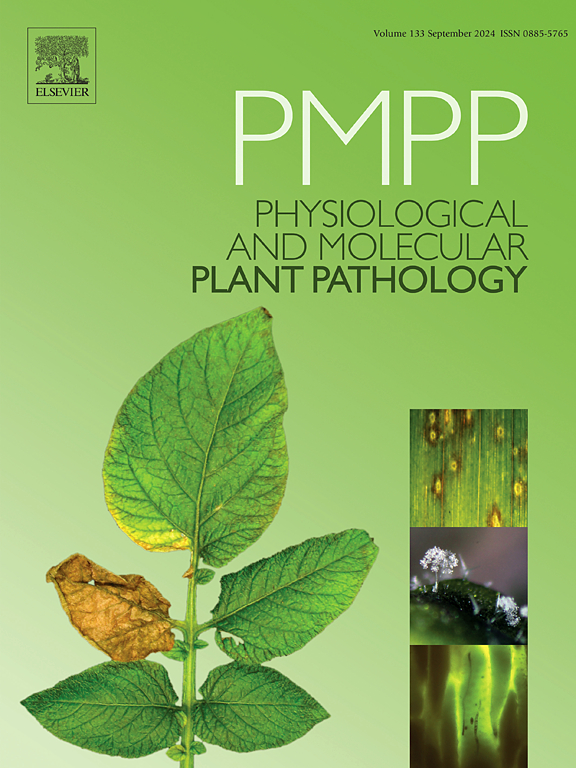Coffee husk waste as a carrier for bioagents: development of Trichoderma-Bacillus consortia and their antimicrobials against soil borne Phytophthora cinnamomi Rands. in avocado
IF 3.3
3区 农林科学
Q2 PLANT SCIENCES
引用次数: 0
Abstract
In vitro studies identified Trichoderma harzianum T(MP)-7 and Bacillus amyloliquefaciens B(TI)-3 as effective biocontrol agents against Phytophthora cinnamomi PC(TKI)-10. The isolates were found compatible under in vitro conditions, and a bioformulation combining them in a 1:1 ratio was tested in different substrates. Among tested, coffee husk-based bioformulations supported the highest microbial populations, with initial counts of T. harzianum T(MP)-7 at 7.5 × 1012 CFU/g and B. amyloliquefaciens B(TI)-3 at 6.8 × 1011 CFU/g, which declined to 3.1 × 107 and 3.8 × 108 CFU/g, respectively, by day 120. In soil amended with coffee husk-based bioformulations, initial counts of T. harzianum T(MP)-7 (5.8 × 107 CFU/g) and B. amyloliquefaciens B(TI)-3 (4.3 × 107 CFU/g) declined to 2.4 × 103 and 1.5 × 103 CFU/g, respectively, over the same period. Coffee husk-based bioformulation significantly enhanced avocado seedling growth, achieving a 92 % germination rate, 14.00 cm root length, 52.43 cm shoot length, and an average of 16.33 leaves. GC-MS analysis identified multiple antifungal compounds, including azelaic acid, palmitic acid, stearic acid, squalene, caffeic acid, gallic acid, chlorogenic acid, and 3-hydroxybenzoic acid. Additionally, B. amyloliquefaciens B(TI)-3 harbored antifungal antibiotic-producing genes, successfully amplifying iturin D (800 bp), bacillomycin D (482 bp), iturin C (506 bp), bacillomycin A (344 bp), fengycin D (220 bp), mycosubtilin (482 bp), surfactin (675 bp), and β-glucanase (400 bp). Similarly, T. harzianum T(MP)-7 tested positive for chitinase (1700 bp) and β-1,3-glucanase (850 bp). Soil application of coffee husk-based bioformulation at 10 g/kg, alone or combined with arbuscular mycorrhizal fungi (AMF) and micronutrients significantly reduced P. cinnamomi disease severity. The combined treatment resulted in a mean disease severity index (DSI) of 16.00 %, representing a 64.71 % reduction over control, while coffee husk-based bioformulation alone reduced DSI to 21.31 % (53.87 % reduction). These findings highlight the potential of coffee husk-based bioformulations as a sustainable biocontrol strategy against P. cinnamomi, improving plant health and growth in avocado cultivation.
咖啡壳废弃物作为生物制剂的载体:木霉-联合芽孢杆菌的发展及其对土壤传播的肉桂疫霉的抗菌作用。在鳄梨
体外研究证实哈兹木霉T(MP)-7和解淀粉芽孢杆菌B(TI)-3是对肉桂疫霉PC(TKI)-10有效的生物防治剂。在体外条件下发现分离物是相容的,并在不同底物中以1:1的比例组合了一种生物制剂。其中,以咖啡壳为基础的生物制剂支持的微生物数量最高,哈兹芽孢杆菌T(MP)-7的初始计数为7.5 × 1012 CFU/g,解淀粉芽孢杆菌B(TI)-3的初始计数为6.8 × 1011 CFU/g,到第120天分别下降到3.1 × 107和3.8 × 108 CFU/g。在以咖啡壳为基础的生物制剂改良的土壤中,哈兹芽孢杆菌T(MP)-7 (5.8 × 107 CFU/g)和解淀粉芽孢杆菌B(TI)-3 (4.3 × 107 CFU/g)的初始计数在同一时期分别下降到2.4 × 103和1.5 × 103 CFU/g。以咖啡壳为基础的生物制剂显著促进了牛油果幼苗的生长,发芽率达到92%,根长14.00 cm,茎长52.43 cm,平均叶片16.33片。GC-MS分析鉴定出多种抗真菌化合物,包括壬二酸、棕榈酸、硬脂酸、角鲨烯、咖啡酸、没食子酸、绿原酸和3-羟基苯甲酸。此外,B. amyloliquefaciens B(TI)-3携带抗真菌抗生素产生基因,成功扩增iturin D (800 bp)、bacillomycin D (482 bp)、iturin C (506 bp)、bacillomycin A (344 bp)、fengycin D (220 bp)、mycosubtilin (482 bp)、surfactin (675 bp)和β-葡聚糖酶(400 bp)。同样,T. harzianum T(MP)-7检测几丁质酶(1700 bp)和β-1,3-葡聚糖酶(850 bp)呈阳性。土壤施用10 g/kg的咖啡壳生物制剂,单独施用或与丛枝菌根真菌(AMF)和微量营养素联合施用可显著降低肉桂病的严重程度。联合治疗导致平均疾病严重程度指数(DSI)为16.00%,比对照组降低64.71%,而单独使用咖啡壳生物制剂将DSI降低至21.31%(降低53.87%)。这些发现强调了咖啡壳基生物制剂作为一种可持续的生物防治策略的潜力,可以改善鳄梨栽培中的植物健康和生长。
本文章由计算机程序翻译,如有差异,请以英文原文为准。
求助全文
约1分钟内获得全文
求助全文
来源期刊
CiteScore
4.30
自引率
7.40%
发文量
130
审稿时长
38 days
期刊介绍:
Physiological and Molecular Plant Pathology provides an International forum for original research papers, reviews, and commentaries on all aspects of the molecular biology, biochemistry, physiology, histology and cytology, genetics and evolution of plant-microbe interactions.
Papers on all kinds of infective pathogen, including viruses, prokaryotes, fungi, and nematodes, as well as mutualistic organisms such as Rhizobium and mycorrhyzal fungi, are acceptable as long as they have a bearing on the interaction between pathogen and plant.

 求助内容:
求助内容: 应助结果提醒方式:
应助结果提醒方式:


